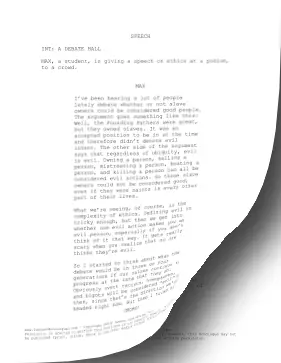

A student gives a passionate anti-meat speech during an ethics debate. 2-3 minute dramatic monologue, good for teenage boy.
SPEECH
INT: A DEBATE HALL
MAX, a student, is giving a speech on ethics at a podium, to a crowd.
MAX
I've been hearing a lot of people lately debate whether or not slave owners could be considered good people. The argument goes something like this: Well, the Founding Fathers were great, but they owned slaves. It was an accepted position to be in at the time and therefore didn't denote evil intent. The other side of the argument says that regardless of ubiquity, evil is evil. Owning a person, selling a person, mistreating a person, beating a person, and killing a person can all be considered evil actions. So those slave owners could not be considered good, even if they were saints in every other part of their lives.
What we're seeing, of course, is the complexity of ethics. Defining evil is tricky enough, but then we get into whether one evil action makes you an evil person, especially if you don't think of it that way. It gets really scary when you realize that no one thinks they're evil.
So I started to think about what the debate would be in three or four generations if our values continue to progress at the rate that they do. Obviously overt racists, homophobes, and bigots will be considered "evil" by then, since that's the direction we're headed right now. But then I tried to consider what would make me "evil" to someone in a hundred or two hundred years. What might I be doing now that would wipe me from consideration of being a "good" person?
And I realized that this generation, like all our generations before, considers ethics mainly when it comes to humans. Other living creatures don't factor in, based purely on the fact that they're not us. We can talk about "sentience" and "intelligence," but a human baby is less cognizant than a dog or a pig, but we obviously value the baby higher.
I say "obviously." Why obviously? What gives us more of a right to be on this earth when we don't treat it any better? Or to cage, torture, and kill animals? Even if our only barometer on whether something is ethical or not is "Does it cause pain?" it already fails the test.
You can argue that it's natural, that we're omnivores, and that it's our biological imperative to eat meat. But that argument has been used to fuel every single uncivil act we've ever wanted free rein to do. Biology does give an excuse for why we want to do something, but it doesn't excuse the action itself. We've created civilization, for better or worse, and there are some things we've agreed are detrimental to the upkeep of the world. If we really think we're better than animals, then we have to start acting like it. Or we won't know which side of history we'll end up on.